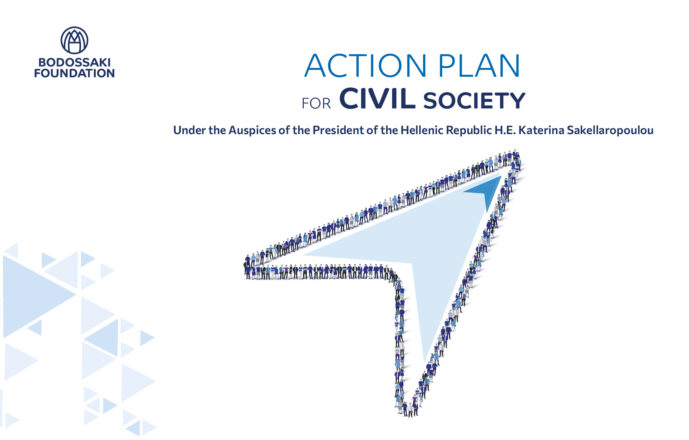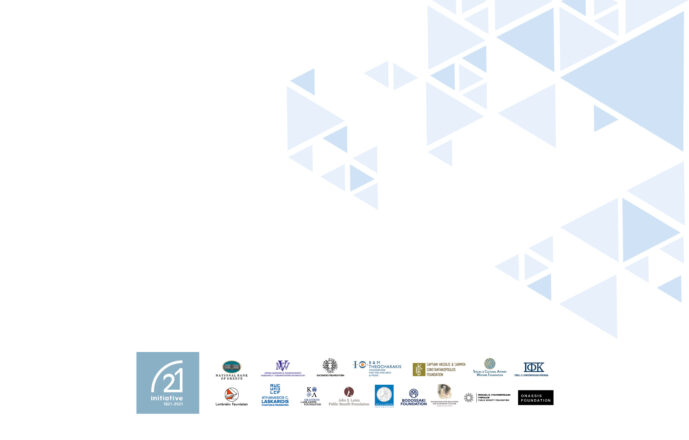The Bodossaki Foundation presents the Action Plan for Civil Society in Greece, following its previous Action Plans for the University of 2030, the improvement of Public Health, and the Environment and Climate—areas aligned with the Foundation’s strategic pillars. Like its three predecessors, the Action Plan for Civil Society is under the auspices of H.E. the President of the Hellenic Republic, Katerina Sakellaropoulou, and will also be made available for relevant state authorities to implement.
The Plan provides a comprehensive overview of the current state of Civil Society in Greece, incorporates best practices from international experience, identifies areas for improvement, and proposes actionable changes based on three key pillars: institutional functionality, financial sustainability, and social interaction.
The recommendations are directed both to the State—emphasizing the critical importance of an appropriate institutional framework for the proper and effective functioning of Civil Society—and to the Civil Society sector itself, offering recommendations for self-regulation.
The Action Plan for Civil Society, available here, is the result of collaborative voluntary work by 30 members of the academic community, board members, and executives from across the spectrum of Civil Society. In preparing the Plan, the Bodossaki Foundation has engaged with organizations, philanthropic foundations, academia, and research institutions (think tanks).
Following an invitation from the Foundation, the following Central Coordinating Committee was formed to develop visionary and practical proposals for Civil Society in Greece:
- Xenophon Kappas, General Director of the Captain Vassilis and Carmen Constantakopoulos Foundation, Coordinator
- Fay Makantasi, Research Director, DIANEOSIS
- Stavros Benos, President, DIAZOMA
- Spyros Blavoukos, Professor of Political Science, ELIAMEP – Athens University of Economics and Business
- Ioannis Papadatos, Pediatrician, Vice President of Together for Children
- Eva Polyzogopoulou, Country Director, ActionAid Hellas
- Dimitris A. Sotiropoulos, Professor of Political Science, National and Kapodistrian University of Athens (EKPA)
- Valia Fragkou, Executive Director, Athina I. Martinou Foundation
- Svetoslav Danchev, Head of Microeconomic Analysis & Policy Unit, IOBE (Foundation for Economic & Industrial Research)
Additionally, 22 experts, scientists, and representatives from organizations, foundations, and Civil Society entities contributed significantly to the initiative as members of the Support Committee:
- Chrysafο Arvaniti, Program Manager for Innovation, MSc in Global Health – Disaster Medicine, National and Kapodistrian University of Athens
- Ilias Valentis, Research Analyst, DIANEOSIS
- Nikos Vettas, Professor of Economics, Athens University of Economics and Business, General Director of IOBE (Foundation for Economic & Industrial Research)
- Nikos Dedes, General Secretary, Greek Patients Association
- Lina Zirgqnou-Kazolea, PhD Candidate, Department of Political Science & Public Administration, National and Kapodistrian University of Athens
- Alexia Katsaouni, President, Desmos
- Dimitris Kerameus, Lawyer
- Eva Lianou, General Director, John S. Latsis Public Benefit Foundation
- Konstantina Demiri, Director, Hellenic Ornithological Society
- Myrto Xanthopoulou, Advocacy Specialist, SOS Children’s Villages
- Daphne Oikonomou, Honorary President, Cerebral Palsy Greece/Open Door
- Savvas Papadopoulos, Project Manager European Institutions & Policies, ELIAMEP
- Fotis Papathanasiou, President of the Association of the Foundations “FILOTIS“
- Nikos Petrou, President, Hellenic Society for the Protection of Nature
- Anastasios Samouilidis, Legal Counsel, Greek Patients Association
- Vassilis Sfakianopoulos, Founder, Save Your Hood
- Petros Fatouros, Lawyer
- Sotiris Foteas, Lawyer
- Anastasia Chalkidou, Accounting Director & Co-founder, Quantum
- Christos Chiotis, Visual Communication Designer & Digital Applications Associate
- Asteris Huliaras, Professor, Department of Political Science & International Relations, University of the Peloponnese
- Paul Kidner, Senior Advisor, TIMA Foundation
After 12 months of voluntary work, meetings and research, the Central Coordinating Committee, in collaboration with the Scientific Support Committee, has developed a policy document on the evolution of Civil Society in Greece, taking into account international best practices. The draft was further enriched and substantiated with contributions from 35 members of Civil Society. The final version of the Action Plan was shaped by incorporating findings from a recently concluded public consultation.
The Bodossaki Foundation’s Action Plan for Civil Society is an integral part of the Foundation’s involvement in the 1821-2021 Initiative. The official presentation of the plan was held on November 27th at the Benaki Museum, 138 Pireos Street.
For the Bodossaki Foundation, strengthening Civil Society is a strategic pillar of action. The Foundation supports the development of a strong and independent Civil Society, along with the establishment of an appropriate institutional framework to enable its effective operation. An active, healthy, and dynamic Civil Society can complement the state by providing services in critical areas such as health and social welfare, offering support during emergencies, and contributing to the overall improvement of citizens’ daily lives, the protection of human rights, and the promotion of democratic values.
The goal of the Action Plan is to present proposals aimed at improving the effectiveness of Civil Society and amplifying its contributions. The Bodossaki Foundation hopes that these proposals will act as a catalyst for extensive dialogue, broad consensus, and the political will needed to upgrade and empower Civil Society in our country.
The Importance of Civil Society in Greece and Beyond
In Greece, despite its historically significant contributions, the activities of Civil Society remain relatively limited compared to other EU countries. Its institutional role receives minimal recognition from the state at national, regional, and local levels. Furthermore, studies indicate low public trust in the work of Civil Society organizations, coupled with limited citizen participation in voluntary initiatives and Civil Society activities.
According to findings from a study conducted by IOBE (Foundation for Economic and Industrial Research) on behalf of the Bodossaki Foundation, within the framework of the Active Citizens Fund program, the contribution of Civil Society to Greek society and economy is multifaceted and highly significant. The activities of Civil Society Organizations (CSOs) directly or indirectly support the production of 1.6% of the country’s GDP and employ 1.9% of the workforce in Greece. In absolute terms, the contribution of CSOs to the GDP for 2021 is estimated at €3.0 billion, supporting 88,400 jobs. These figures do not include the economic value of volunteerism, which amounted to €357 million in 2021, equivalent to approximately 0.2% of the country’s GDP.


